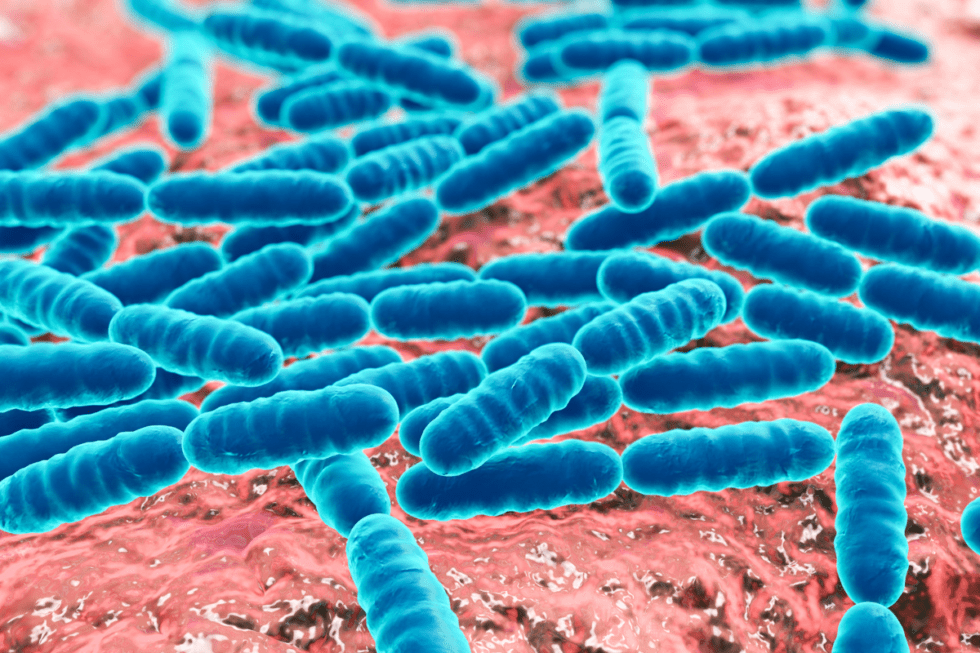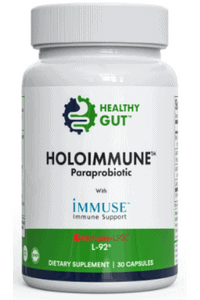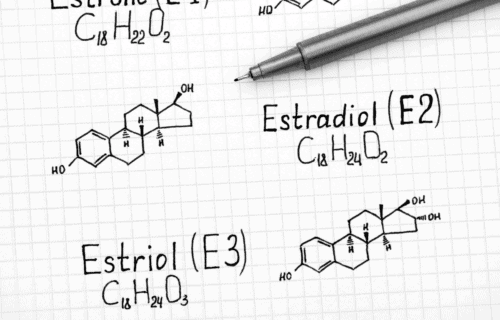
Paraprobiotics: Can Paraprobiotics Support Mast Cells?
You’ve probably heard that probiotics can support your health, but have you heard of paraprobiotics?
These days more than ever, we’re all doing our best to stay healthy…especially with Mast Cell Activation Syndrome (MCAS).
I started taking a paraprobiotic to help support my health. And this paraprobiotic really helped my client, “Stephanie”, too.
“Stephanie” had a lot of the common symptoms of MCAS and Histamine Intolerance (HIT).
She had gastrointestinal issues like diarrhea and bloating.
Her skin itched a lot.
She’d often have allergy-like symptoms, such as runny nose and headaches.
She had sleep issues, too.
Sound familiar?
We’d barely started our work together when she ran into a series of illnesses.
She got a stomach bug. It was going around her daughter’s daycare.
Not long after that, she got a cold at work.
Then, she got the flu.
She told me it felt like every time she took one step forward with her MCAS, getting sick sent her two steps back.
That made sense. Infections can trigger a mast cell immune response.
And I was concerned that she was so prone to infection.
That’s when I suggested she try a paraprobiotic as additional supplementation to give her immune system a boost.
I thought the paraprobiotic may offer additional health benefits by helping with some of her most irritating MCAS and HIT related symptoms, too.
Keep reading to hear the rest of her story.
And learn more about:
- what paraprobiotics are
- how paraprobiotics differ from probiotics and prebiotics
- what paraprobiotics can help with
- what to look for in a paraprobiotic supplement
- why HoloImmune may be the best paraprobiotic for MCAS
- who should and shouldn’t consider a paraprobiotic
First, here’s the good news about Stephanie’s story.
A Health Turn-Around with Paraprobiotics
It’s important you know that this blog post is for informational and educational purposes. It’s not meant to treat any health condition or to be prescriptive for anyone. If you have any medical condition, it is critical you work under the care and guidance of a licensed medical provider.
You’re likely making a lot of changes in your life to address your Mast Cell Activation Syndrome (MCAS) and Histamine Intolerance.
You’re probably eating a lower histamine diet, cleaning up your skincare, and working on your nervous system.
Usually, it’s all these things and addressing your root causes that makes the difference.
One single supplement alone is not going to be the answer to all your problems.
But the right supplements, at the right time, can be helpful in getting your health back on track.
Here’s what I saw with Stephanie.
As you read, Stephanie was getting sick…a lot.
Your immune system may be dysregulated, especially if you’ve dealt with Mold Toxicity.
You may be more prone to catching more bugs. Like Stephanie was.
After she started the paraprobiotic, though, she didn’t get sick as much…even when everything was going around the office or daycare.
Once she wasn’t coming down with something all the time, she was starting to feel like she was finally seeing some real, lasting progress.
She saw more improvement with her MCAS and Histamine Intolerance once she wasn’t battling all those pathogens.
And she told me that she felt like her MCAS and Histamine Intolerance related symptoms were improving more, too.
Again, there isn’t one magical supplement that will make or break your progress with MCAS or Histamine Intolerance.
But there are supplements that can give you a health advantage. And it looks like paraprobiotics may be ones to consider!
Especially if you want to support healthy, normal immune functioning.
So, just what are paraprobiotics? And how are they different from probiotics, prebiotics, and postbiotics?
Keep reading to learn more.
Probiotics, Prebiotics, and Postbiotics
To understand paraprobiotics better, let’s start with something you may have heard of already.
Probiotics, prebiotics, and postbiotics.
What are Probiotics?
Probiotics are live microorganisms.
This term was first used in the mid-1960s to describe substances secreted by one microorganism which stimulated the growth of another organism.
For example, your gut microbiome may be out of balance because bad bacteria outcompeted the good bacteria.
A probiotic would replenish the good bacterial strains. That can help get gut flora back in balance.
Related Article: Histamine Lowering Probiotics
Note: If you suspect you have MCAS or Histamine Intolerance, it is important to work with your practitioner to find a low histamine probiotic that won’t trigger your symptoms.
Probiotics have been shown in numerous studies to help with conditions like:
- Antibiotic-associated diarrhea
- Diarrhea in infants
- Relapsing Clostridium difficile colitis
- H. pylori infections
- IBS (Irritable Bowel Syndrome)
- UTIs in women
- Infections related to surgeries
Probiotics derived from lactic acid bacteria like Lactobacillus rhamnosus and Lactobacillus plantarum have been shown to have immunomodulatory effects.
This means they can have an effect on the immune system.
A huge amount of your immune system is found in the gut.
This is why there’s a big relationship with mast cell issues and gut issues. Remember, mast cells are part of your immune system.
So, a healthy gut can result in fewer mast cell issues.
And an unhealthy gut from things like SIBO (small intestinal bacterial overgrowth), SIFO (small intestinal fungal overgrowth), or leaky gut, can trigger mast cell issues.
In this way, probiotics can be helpful for supporting good gut health. So, that means they help support your immune system (including mast cells).
You may also have heard of some of the benefits of prebiotics and postbiotics. Prebiotics and postbiotics play important roles in your body, too.
What are Prebiotics?
Prebiotics are compounds that feed the good bacteria and fungi in your gut.
You’ll find these in foods like:
- Onion
- Garlic
- Wheat
- Lentils
- Honey
and more.
Probiotic bacteria are good gut bacteria. It makes up part of your gut microbiome. (That’s all the flora in your gut.)
When this gut microbiota breaks down prebiotics, the result is postbiotics. And those postbiotics play a role in your health, too.
What are Postbiotics?
Again, postbiotics are essentially what you get when gut bacteria digest or ferment a prebiotic.
Short chain fatty acids (SCFAs) are postbiotics.
SCFAs are important for gut health and immune health. SCFAs help lower inflammation.
That means they are important for Mast Cell Activation Syndrome and Histamine Intolerance. Both of which cause inflammation in your body.
Some SCFAs are:
- Acetate
- Propionate
- Valerate
- Butyrate
You can see how pre-, pro-, and postbiotics can all be helpful.
So why should you consider paraprobiotics?
More on that up next.
What are Paraprobiotics?
Paraprobiotics have been studied since the 1990s. But you don’t hear about them nearly as much as probiotics.
You just read that probiotics are living organisms.
Paraprobiotics are heat-killed probiotics.
This is why they are also called ghost probiotics.
They are non-viable microbial cells. Essentially, this means they are dead, not living. And often, they are immature cells.
Studies are showing that viability (life) isn’t necessarily required to get health benefits. So, now we are starting to hear more about paraprobiotics.
What studies are showing is that non-viable (non-living) microbial cells may produce better health benefits like immune modulation.
And here’s something else to know.
In some cases, taking live probiotics may be dangerous to people with a weakened immune system.
Paraprobiotics are attracting attention because of their safety.
They can be used by people with weakened immune systems as well as the elderly. Non-viable microbial cells may reduce the risk of sepsis and antibiotic resistance.
And they have a long shelf-life. Probiotics are living, so some aren’t as shelf stable.
Here are some health benefits paraprobiotics are showing these properties:
- Regulating the adaptive and innate immune systems (immunomodulation)
- Cholesterol lowering
- Inhibiting cell growth (often used to control malignant cells)
- Anti-inflammatory
- Antioxidant
Like probiotics, paraprobiotics are derived from different strains of bacteria.
One of these strains is really standing out. That’s because of the role it plays in activating certain immune cells.
Read more on those immune cells next. Then learn about the strain that helps activate these important immune cells.
The Innate and Adaptive Immune Systems
There are 2 sides to your immune system: the innate and adaptive.
Your innate immune system is your first line of defense against pathogens.
Antigens trigger your T cell receptors to produce cytokines and launch an immune response against invaders.
Inflammation, red throat, and fever are part of your innate system.
Your innate system responds quickly. And the response is more generalized. It’s not as targeted.
Your adaptive immune system is slower to respond, though. But it is more specific in what it targets. It’s also more powerful. Your adaptive system is responsible for producing long lasting antibodies against pathogens.
Together these two systems work to protect you.
Both the innate and adaptive systems produce specialized immune cells.
There are lots of different types of specialized immune cells.
But there is one “commander in chief”.
It can activate most types of immune cells in both the innate and adaptive immune systems.
These “commander in chief” cells are the pDCs (plasmacytoid Dendritic Cell).
In other words, pDCs can activate all the other immune cells in the immune system.
Having more active pDCs can help your whole immune system work better.
And there’s something that activates these pDCs. Read more on that next.
The Paraprobiotic that Activates pDCs
A specific paraprobitoic called Lactococcus lactis strain Plasma (LC-Plasma) has been shown to activate pDCs in the small intestine.
In studies, benefits from this paraprobiotic include:
- Stimulating your body’s natural defenses
- Supporting upper respiratory health
- Providing immune support during high-intensity training
There have been over 20 studies on this alone.
This paraprobiotic can be found in the supplement called HoloImmune, formulated by Steven Wright from Healthy Gut. It’s listed under their proprietary name, Immuse™.

HoloImmune has been reported to help with:
- Under-active or overactive immune systems
- Environmental allergies
- Food allergies
- Relief of skin issues like acne and dryness
- Immune system support during stressful times
- Oral gum health
- Gut-immune health
- Improved memory
- Histamine Intolerance
- Mast Cell Activation Syndrome
And here’s why it may be especially helpful if you have Mast Cell Activation Syndrome.
HoloImmune and Mast Cell Activation Syndrome
With Mast Cell Activation Syndrome (MCAS), it’s likely you have a dysregulated immune system. Your immune system is overly reactive.
That’s why you may start noticing increased sensitivities, even when those around you seem unaffected.
If you have a dysregulated immune system, here’s what can happen.
You can be triggered by any threat such as bacteria, pollen, viruses, toxic chemicals. That’s all quite normal.
And normally, your immune system should quit responding when that threat has been dealt with.
But with MCAS your immune system continues to respond. It doesn’t know when to shut off.
Or your mast cells may send out the wrong responses.
That’s where adaptogenic products like HoloImmune can be helpful.
Adaptogenic means they adapt to what your body needs.
In other words, the response isn’t too much or too little.
This is really important with MCAS. You don’t want to amp up your mast cells unnecessarily.
You want them to respond normally to threats. You don’t want them to over respond.
And you don’t want them to under respond. An under-response wouldn’t protect you.
A big part of getting MCAS under control and taming down that amped up reactivity.
Think of paraprobiotics as working smarter, not just stronger.
Another way to understand it is this: you don’t need a nail gun when a pushpin will do.
Who Should and Should Not Consider HoloImmune Paraprobiotics
I had a severe case of SIBO (and SIFO) for quite some time. Not to mention the Mold Toxicity that was one of my major root causes of MCAS.
I’m still getting my gut recovered.
I’ve been using some other supplements from Healthy Gut that have been really helpful for years.
I take the digestive enzyme, Holozyme, to help my body break down food and absorb nutrients better.
I take HCL Guard+ to help with low stomach acid.
And I take Tributyrin X. It’s a form of the short chain fatty acid (SCFA), butyrate. It’s a post-biotic. It can help with things like leaky gut and increasing good gut bacteria.
But because of the SIBO, SIFO, and Mold Toxicity, I’ve really struggled with taking most probiotics. Either spore-based or non-spore-based.
This is because when you have severe SIBO like I’ve had, the last thing you want to do is add more bacterial strains to what is already overgrown.
But I still want to get the benefits that probiotics can offer.
This is part of the reason I thought I’d give HoloImmune, the paraprobiotic, a try.
And I’ve been able to take the paraprobiotics without any problems.
Here’s an extra bonus I didn’t know I’d get.
I’m getting immune modulating properties without the gas, bloating, and abdominal pain that I got with most probiotics.
Check out this Facebook Live I did with Steve Wright who created HoloImmune:
Now, when we talk about who may want to consider HoloImmune and who should not consider it, here are some things to think about.
Who HoloImmune Paraprobiotics May Be Helpful For
Like you just read, I was dealing with SIBO, SIFO, and Mold Toxicity.
And while some people who are less sensitive may be ok with live probiotics, I wasn’t.
I’ve been one of the super-sensitive people out there.
And as much as I’ve seen low histamine probiotics work for some of my clients, they just weren’t working for me when I was dealing with all these things at once.
But a paraprobiotic like HoloImmune seems to be easier on people with SIBO. So, if you have SIBO, you may tolerate paraprobiotics better.
Paraprobiotics may be helpful if you have:
- SIBO and can’t tolerate live probiotics
- MCAS
- Histamine Intolerance
- Side effects like gas and bloating when using probiotics
- A weakened immune system
- A dysregulated immune system
- Brain fog
- A lot of allergy-like symptoms
- Skin conditions like dryness or acne
- Food sensitivities
- A tendency to be more prone to illness
- Mold Toxicity
Speaking of Mold Toxicity, there is one more thing you should be aware of.
Mold Toxicity is the #1 root cause of MCAS we see in the Mast Cell 360 practice.
It can cause dysregulation in your nervous system, your immune system, and your digestive system.
So, a supplement that can help your gut health and your immune health can be really helpful when you are dealing with Mold Toxicity.
But there is one thing you may need to consider.
Keep reading to find out what that is.
Who Shouldn’t Consider HoloImmune: Beta-glucans and Mold Toxicity
You may have heard to stay away from products with beta-glucans if you are dealing with mold.
Beta-glucans are naturally occurring polysaccharides (a type of carbohydrate.)
They are found in the cell walls of different organisms such as some plants, yeasts, bacteria, and fungi. You can also find it as a supplement.
Beta-glucans have been shown to have these properties:
- Lower cholesterol levels
- Decrease inflammation
- Improve blood sugar management
- Help with allergies
- Modulate the immune system
Beta-glucans have a lot of benefits. That’s why they are used in HoloImmune.
But here’s where you might not be able to tolerate HoloImmune.
Some people dealing with mold can develop mold allergies.
That’s not uncommon at all.
But some people then develop allergies to the whole fungal kingdom. That’s much less common. The whole fungal kingdom is likely larger than the plant kingdom.
So, it isn’t likely you’d be allergic to every single species in the fungal kingdom. Just like it isn’t likely you’d be allergic to every single plant.
But I have seen it a handful of times.
And if you have developed that severe allergy, you may not tolerate things like Saccharomyces boulardii, a beneficial yeast probiotic.
In our practice, it’s maybe only about 5% of our clients.
Here’s how that relates to beta-glucans.
Remember how you read that beta-glucans are found in some yeasts and bacteria?
That means that if you do have this rarer allergy to the whole fungal kingdom, you may not be able to do beta-glucans, sometimes derived from yeasts (a fungi) and other fungi.
But I can tell you that I’ve had severe Mold Toxicity and a mold allergy. And I’m doing really well with HoloImmune. Other people have reached out sharing that they’re doing well with it, too.
You’ll want to talk with your provider and check it out for yourself to see if this might or might not be for you.
And if you aren’t tolerating any supplements right now, you probably don’t want to start here. Consider starting with some nervous system supports first.
Related Post: The Gupta Program: Review for Chronic Conditions
Then, as you can onboard some supplements, you can start anything new with just drops or sprinkles. You can gradually build up if tolerated.
Other Considerations for HoloImmune Paraprobiotics
HoloImmune is:
- Low histamine
- Low salicylate
- Low lectin
- Low oxalate
- Vegetarian
That covers a lot of needs in our sensitive community.
And it has no fillers. That’s great if you have MCAS because a lot of fillers can be mast cell triggers.
When I talked to Steve from Healthy Gut, he said that generally, HoloImmune seems to be working well for the sensitive population.
I go to Steve from Healthy Gut when I get stuck in my own healthcare journey. And he’s always steered me in the right direction.
And when you use Healthy Gut products, you know you are getting a clean, quality product.
HoloImmune has been a routine part of my supplement regimen for a while now. And I haven’t gotten really sick during the past few years with viruses and such.
And when I started recommending it to my clients, they’ve had a lot of good things to say about it, too.
So, if you are looking for a little extra boost for your gut and your immune system, you can try HoloImmune now and get $15 off with my link.

Have you tried HoloImmune yet? Let us know in the comments!
More on Low Histamine Gut Health
- The Best POST-biotic Butyrate
- Histamine Lowering Probiotics for People with Mast Cell Activation Syndrome and Histamine Intolerance
- Enzymes, Short-Chain Fatty Acids (SCFA’s) and Gut Health
- Frequently Asked Questions: The Gut, SIBO, Mast Cell Activation Syndrome, and Histamine Intolerance
Some links in this website are affiliate links, which means Mast Cell 360 may make a very small commission if you purchase through the link. It never costs you any more to purchase through the links, and we try to find the best deals we can. We only recommend products that we love and use personally or use in the Mast Cell 360 practice. Any commissions help support the newsletter, website, and ongoing research so Mast Cell 360 can continue to offer you free tips, recipes, and info. Thank you for your support!
References
Akter, S., Park, J. H., & Jung, H. K. (2020). Potential Health-Promoting Benefits of Paraprobiotics, Inactivated Probiotic Cells. Journal of microbiology and biotechnology, 30(4), 477–481. https://doi.org/10.4014/jmb.1911.11019
Belorkar, S. A., & Gupta, A. K. (2016). Oligosaccharides: a boon from nature’s desk. AMB Express, 6(1), 82. https://doi.org/10.1186/s13568-016-0253-5
Davani-Davari, D., et al.. (2019). Prebiotics: Definition, Types, Sources, Mechanisms, and Clinical Applications. Foods (Basel, Switzerland), 8(3), 92. https://doi.org/10.3390/foods8030092
De Marco Castro, E., Calder, P. C., & Roche, H. M. (2021). β-1,3/1,6-Glucans and Immunity: State of the Art and Future Directions. Molecular nutrition & food research, 65(1), e1901071. https://doi.org/10.1002/mnfr.201901071
Deshpande, G., Athalye-Jape, G., & Patole, S. (2018). Para-probiotics for Preterm Neonates-The Next Frontier. Nutrients, 10(7), 871. https://doi.org/10.3390/nu10070871
El Khoury, D., Cuda, C., Luhovyy, B. L., & Anderson, G. H. (2012). Beta glucan: health benefits in obesity and metabolic syndrome. Journal of nutrition and metabolism, 2012, 851362. https://doi.org/10.1155/2012/851362
Fuller, R. (1992). History and development of probiotics. In: Probiotics. Springer, Dordrecht. https://doi.org/10.1007/978-94-011-2364-8_1
Goodridge, H. S., Wolf, A. J., & Underhill, D. M. (2009). Beta-glucan recognition by the innate immune system. Immunological reviews, 230(1), 38–50. https://doi.org/10.1111/j.1600-065X.2009.00793.x
Gupta, V., & Garg, R. (2009). Probiotics. Indian journal of medical microbiology, 27(3), 202–209. https://doi.org/10.4103/0255-0857.53201
Siciliano, R. A., Reale, A., Mazzeo, M. F., Morandi, S., Silvetti, T., & Brasca, M. (2021). Paraprobiotics: A New Perspective for Functional Foods and Nutraceuticals. Nutrients, 13(4), 1225. https://doi.org/10.3390/nu13041225
Wright, S. (2022) Mast Cell 360 [Facebook page]. Facebook. Retrieved September 8, 2022 from https://www.facebook.com/watch/?v=3106059572978805




Can you please tell me if this product is high FODMAP? Thank you!
Hi Lee,
Reach out to Healthy Gut customer support. They should be able to help answer this for you. Thanks for your interest.
Here’s their contact info: support@scdlifestyle.com
Hi Lee, It is low FODMAP, since FODMAPs are from fermentable fibers from fruits and veggies, and this product doesn’t contain those!
I find the cautions not very straightforward. Can someone clarify on the mold allergy end if this supp would be helpful or not helpful? It says most will not be allergic to the whole fungi end but if you developed a severe allergy, you may not do well with holoimmune. And if you are allergic to the whole fungi kingdom, you may not do well. I have various mold allergies after toxic mold dysregulated my immune system. I also was tested for TOE (not toe as in attached to your foot, it’s an abbreviation for the specific yeasts) which is a yeast type usually associated with athletes foot, jock itch, vaginal yeast infections, etc. I don’t have yeast overgrowth but became allergic. I’m not allergic to the whole fungi kingdom but I do have some yeast allergies. Trying to figure out exactly what type of yeast it is derived from to know if this would be worth a shot or not.
Hi Jen, you can always reach out to support@healthygut.com to inquire about the individual species used, as they are the manufacturers of this product and this question would be better suited for them. In regards to whether or not Holloimmune might be right for you given your various allergies to mold and yeasts we highly recommend discussing this supplement with your practitioner who is familiar with your case before adding in anything new.